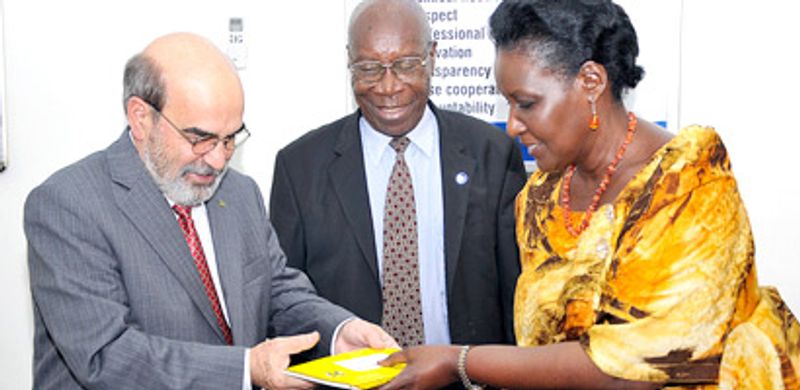
![FAO Director General Graziano da Silva, Agriculture minister Prof. Nyira Zerubabel and Trade Minister Amelia Kyambadde[/caption]The Director General of the Food and Agricultural Organisation (FAO) Graziano da Silva has given cautious support to the proposed law on Genetically Modified Organisms recently tabled in Parliament, saying it is needed to tackle some unique challenges facing Uganda including banana diseases.However, Da Silver warned politicians and other supporters of the proposed law on GMOs that the technology will not, on its own, eradicate hunger and that it carries a number of risks including what he called the ‘risk of GMOs contaminating the environment.</p srcset=](https://sunrise.ug/wp-content/uploads/2013/03/fao8.jpg)
The FAO chief, who was in Uganda last week to meet with government officials emphasised that Uganda would be able to multiply food production by adopting relatively old technologies such as hybridisation and fertiliser use that helped to spur food production in Asia during the green revolution.
“We don’t need GM now to eradicate hunger. If we use the technology of the green revolution, we would multiply food by over 10 times,” said Da Silver.
Da Silver, who served as Brazil’s Minister for Food Security before he joined FAO in 2006 admitted however that bananas for Uganda and Soya for South America may be exceptions, meaning that they may need GM technology to save them.
He further admitted that in the future, because of climate change and rapid population growth, the need to increase food production will necessitate the adoption of GM technology.
GMO technology involves the transfer of a specific gene from one organism to another with the objective of improving output by controlling diseases or increasing an organ’s performance under harsh conditions like extreme drought or floods.
For example, researchers at the National Agricultural Research Laboratories (NARL) at Kawanda have successfully transferred a gene from pepper into banana to control the devastating Banana Bacterial Wilt which has ravaged banana productions across the country.
The FAO chief called for proper labelling on GM products among other measures including maintaining the gene bank to protect small holder farmers against the risk of contamination of the environment that may be posed by GM crops.
Uganda’s State Minister for Agriculture Prof. Zerubabel Nyira however reminded the FAO boss that Uganda now needs a law GM to be able to prepare for the future as well as guard against products like GM seeds that may be smuggled into Uganda from other countries.
Prof. Nyira said: “Knowledge generation has to be far ahead of knowledge application. We need new knowledge and even more importantly, quality assurance to be able to tackle challenges like climate change and pests.”
There are concerns among Ugandan scientists that besides the demonstrated benefits of GM technology in controlling diseases like the devastating Banana Bacterial Wilt in Matooke, the fact that Kenya, with whom we share a porous border, has permitted the use of the technology, calls for a corresponding law to regulate any possible leakages of GMO products into the Ugandan market and farms.
Uganda’s Parliamentary Committee on Science and Technology is currently seeking views from stakeholders about the proposed but controversial National Biotechnology and Biosafety Bill 2012 with the hope of debating it on the floor of the house and passing it before the end of the year. The bill has stayed on the shelf for over a decade although another law allowed for research work on GMOs to be conducted under laboratory and confined field trials.
Some scientists argue that the technology offers hope for improving food security by eradicating diseases like the devastating Banana Bacterial Wilt (BBW), Black Sigatoka which destroy matooke as well as Cassava brown streak which can destroy up to 100% of cassava output.
Sarah Kisoro, the coordinator of RUDMEC argues however that whereas GM technology has potential in improving food security, measures to preserve the environment such as planting trees are critical in ensuring that the pests are kept at bay.
“We are experiencing an increase in the emergency of crop pests and diseases because we have destroyed the trees that used to keep the environment cool but also protect crops against pests.”
Kisoro’s view is supported by other findings that show that places that have encountered widespread deforestation such as Eastern and Central Uganda have also witnessed an outbreak of serious crop diseases and diseases.
While serving as Brazil’s Minister for Food Security and Fight Against Hunger, Da Silver is recognised for having helped to lift 24 million people out of extreme poverty in five years.














Sunrise Admin
Leave a Comment
Your email address will not be published.